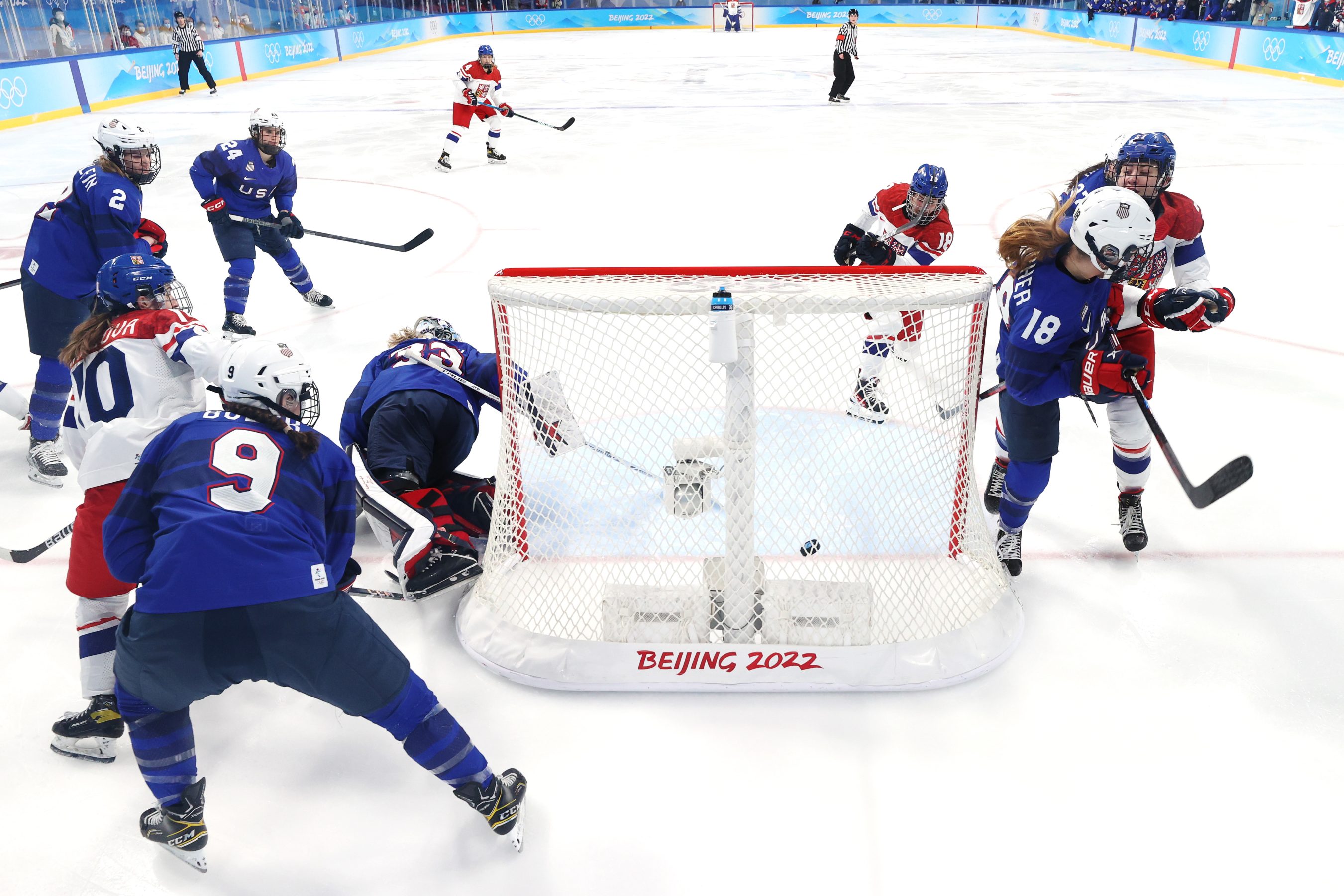The "hot goalie" is a terrifying force in hockey that transcends all leagues, nations, and competitions, and the U.S. women's hockey team ran into one on Friday that made their Olympic quarterfinal so much more difficult than it should have been. The Americans still beat the Czech Republic, 4-1, but thanks to some ridiculous shot-stopping from Klara Peslarova, and a big break for the Czechs, the heavy underdogs were pretty dang close to flipping the entire tournament upside down.
While their assumed opponents in the gold medal game, Canada, easily took down Sweden 11-0 in their own quarterfinal today, the U.S. had to deal with about 45 stressful minutes before they finally broke out. (A late empty-netter helps make the scoreline look more comfortable than it felt.) Peslarova deserves essentially all of the credit for the tightness of the game. The 25-year-old first-time Olympian stopped all 18 of the U.S.'s shots in the first period and made 55 saves on the day. Her offense, meanwhile, generated only six shots of their own for the entire game despite a number of American penalties that tried to help out a Czech power play that's gone 0-for-21 in China.
But all you need in order to score one goal is one shot, and that's how the Czechs struck first. Five minutes into the second period, in their very first attempt all game, a turnover in the U.S.'s defensive zone gave the Czechs an opportunity. Tereza Vanisova whiffed on a pass to the slot as she approached the net, but stayed near enough to the puck that she was able to backhand it off the pads of U.S. goalie Alex Cavallini. Jesse Compher was unable to clear the puck off the crease, and it fell perfectly onto the stick of Michaela Pejzlova, who had a wide open net to tap it into. (The IOC is being very rude about us embedding some of their videos, but you can check it all out over at this link.)
Suddenly, the U.S. was staring into the abyss. Peslarova had a magnet in her glove. The Czechs had the luxury of parking the bus. And there were only 35 minutes left to make things right.
Luckily, Hilary Knight only needed 48 seconds, as the veterans of the U.S. responded coolly and effectively to the sudden shock of adversity. Kendall Coyne Schofield created space to take yet another shot, Peslarova didn't keep it close to her body, and a determined Knight jumped all over it to knock it up and in.
Instant reply!
— NBC Olympics (@NBCOlympics) February 11, 2022
After the Czech Republic took a shocking lead, Hilary Knight levels the game for @TeamUSA!
📺: @USA_Network & @peacockTV
💻: https://t.co/DaRR18atEa pic.twitter.com/3RpCJwk20T
A 1-1 score didn't exactly inspire confidence, either, especially when Dani Cameranesi picked up a five-minute boarding penalty later in the second. But that's how it stayed until seven minutes into the third, when a series of Peslarova misfortunes allowed the U.S. a lead. First, she lost her stick during an American attack. Then, her mask seemed to come loose, and despite her efforts to get a referee stoppage, play continued on. Finally, a brutal deflection off one of her own teammates on a Lee Stecklein shot from the point sneaked through to make it 2-1.
.@TeamUSA takes the lead!
— NBC Olympics (@NBCOlympics) February 11, 2022
Lee Stecklein deflects the puck into the back of the net and @usahockey is up 2-1 midway through the 3rd period! #WinterOlympics \ #WatchWithUS
📺: @USA_Network & @peacockTV
💻: https://t.co/DaRR18atEa pic.twitter.com/GaNb3oXGe3
Peslarova did the best she could to keep the Czechs alive, but a tap-in from Savannah Harmon with three minutes remaining removed all doubt. In the end, however, Peslarova seemed happy enough with the difficulties she caused.
“It’s so nice seeing them frustrated, seeing them angry,” she said about the Americans. “Hopefully, we show the people that we’re not the underdogs, that we can also play hockey. They didn’t really know about us, and now they know.”
On the other side, U.S. coach Joel Johnson made a preemptive strike at any critics disappointed by a relatively pedestrian-looking final score.
“When I read some articles from people who have no clue what they should be talking about, this game is a good reminder for them,” he said. “There might be some scores that look a little lopsided, but this is exactly what everybody knows, that people are making strides.”
Next up, the U.S. will face the winner of Finland vs. Japan on Valentine's Day.
Though Canada and their trail of destruction does loom quite large in the U.S.'s near-future, I did find myself looking on the bright side even through a nail-biter of a second intermission. While maybe there would be some benefit to being able to take it easy through a third period in a string of otherwise high-intensity games, the kind of experience gained by trying to shoot your way through a brick wall in a do-or-die scenario seems more likely to come in handy at the conclusion of this chase for another gold.
If we assume the Canadian rematch in the final game, the U.S. is going to be the underdogs, with a guillotine waiting to fall on their necks at the slightest mistake. In that scenario, the name of the game will be finding a way to win under pressure, and after going down against the Czechs, this iteration of the U.S. team passed their first real test in that arena.






